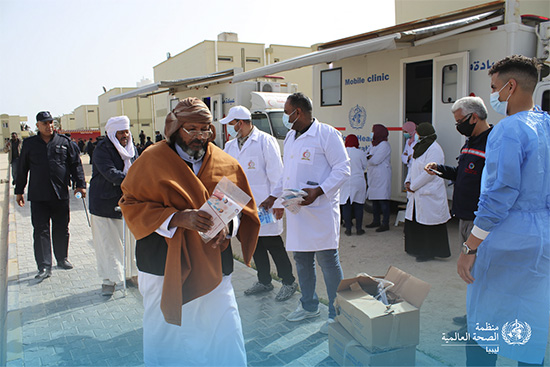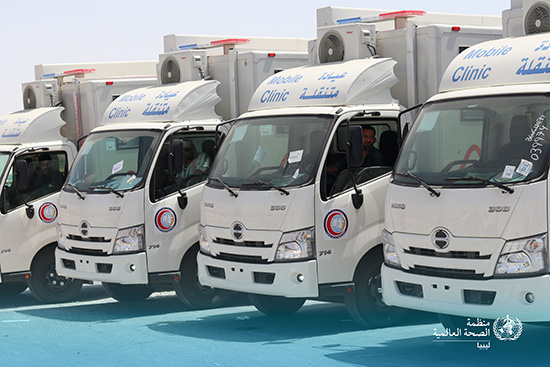 Mobile clinics donated by WHO is disseminating educational messages on COVID-19 prevention measures and vaccines in Benghazi, Libya. Credit: WHO Libya
Mobile clinics donated by WHO is disseminating educational messages on COVID-19 prevention measures and vaccines in Benghazi, Libya. Credit: WHO Libya
21 July 2022- A generous donation from the Government of Norway has enabled the World Health Organization (WHO) to deliver six mobile medical clinics to underserved areas in Libya to support the provision of primary health care (PHC) services to people in need.
The mobile clinics will be deployed to Alshati, Misrata, Tobruk, Benghazi and Tripoli, hosting thousands of internally displaced people and other people in need. The services provided by each clinic include:
Ante- and post-natal care and other reproductive health services.
Routine immunization.
Treatments for patients with common noncommunicable diseases such as hypertension and diabetes.
The clinics will also offer group counseling sessions on health promotion and COVID-19 prevention for up to 120 people a day.
 WHO and Libyan health partners received six mobile clinics at Benghazi port in Libya. Credit: WHO Libya
WHO and Libyan health partners received six mobile clinics at Benghazi port in Libya. Credit: WHO Libya
His excellency Mr Ramadan Abu Janah, the Deputy Prime Minister, Acting Minister of Health in the Libyan Government of National Unity, said the government was working hand in hand with WHO to strengthen health services in general and PHC services in particular. “We are working to ensure that essential, sustainable health services are provided across the country. A thriving health system is the basis for a healthy population.”
“People in conflict-affected and hard-to-reach areas were in dire need of health care services,” said Ms Elizabeth Hoff, the WHO Representative in Libya. “The funds from the Government of Norway have allowed WHO to support the provision of essential health care to thousands of people. WHO is very grateful to Norway for its generous donation.”
Norway’s latest contribution has allowed WHO to support a wide range of activities in Libya, including strengthening PHC services, training staff, and providing medicines and personal protective equipment to health facilities throughout the country. As a result, over 300 000 people have benefited from the essential medicines and medical supplies provided by WHO.








